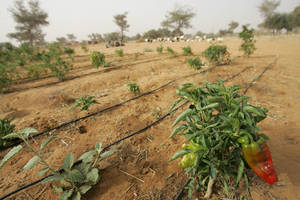 a project aimed at helping Malawi, Vietnam and Zambia make the transition to a "climate-smart" approach to agriculture show that some farmers are struggling to adopt the new methods, while others are finding ways to cope well with climate-change problems like late rains.
a project aimed at helping Malawi, Vietnam and Zambia make the transition to a "climate-smart" approach to agriculture show that some farmers are struggling to adopt the new methods, while others are finding ways to cope well with climate-change problems like late rains."To broaden the options available to farmers, we believe that increased investment, coming from both traditional agricultural finance, as well as emerging climate finance such as the Green Climate Fund, may be required to help farmers make the needed transition," said Leslie Lipper, leader of FAO's Economics and Policy Innovations for Climate-Smart Agriculture (EPIC) Programme, which houses the project.
Launched in January 2012, the €5.3-million three-year FAO-EC project promotes a climate-smart agriculture approach in each country, with supporting activities ranging from research to policy support, and investment proposals.
Climate-smart agriculture explained
Agriculture and the communities who depend on it for their livelihoods and food security are highly vulnerable to climate change impacts. At the same time agriculture, as a significant producer of greenhouse gases, contributes to global warming.
"Climate-smart agriculture" is an approach that seeks to position the agricultural sector as a solution to these major challenges, prioritizing food security and the adaptation needed to achieve it, while reaping potential mitigation co-benefits.
It involves making changes in farming systems that achieve these multiple goals, as well as in supporting institutions and policies.
African project experience
One of the main activities of the project is identifying which agricultural practices are "climate smart" for specific conditions.
For example, the project has studied conservation agriculture (CA), which involves reduced tillage, permanent soil cover and crop rotation. The practice has been promoted by the governments of Malawi and Zambia.
Conservation agriculture can, at least potentially, increase productivity through better soils, and help farmers adapt to climate change through better water retention. It also promotes can help mitigate climate change by trapping carbon in the soil.
Project analysis indicates that many farmers in the two countries have difficulties adopting the full CA package, because, for example, they need crop residues for animal feed instead of soil cover. Sometimes the problem is that farmers are too poor to wait several seasons for the benefits.
But the project is also finding that climate change is already altering which agricultural practices will work best for farmers, which could increase the appeal of CA.
In Zambia, analysis of climate data shows an increasingly late onset of rains in some areas. Since crops are only planted after the first rains, late rains mean late planting, which can seriously shorten the growing season.
Project research shows that farmers in these areas of variable rainfall and late onset of rains are the most likely to maintain CA practices, which has the advantage of preparing the land before rains arrive.
Vietnam project experience
In Vietnam, at the project site in the northern part of the country, maize is planted on sloping land all the way to the tops of mountains, which in theory should be covered only in forest. Once the maize is harvested, the rains come, washing away the soil. The erosion has led to landslides, with loss of life.
Project researchers studying Vietnamese climate data have found that climate variability is increasing, which will exacerbate the erosion problem.
In response, the project is looking at more sustainable land management practices but also the use of perennial crops such as coffee and tea, which unlike maize can stay in the ground for 30-40 years. However, coffee and tea production require some—— years to generate high returns, which is a challenge for farmers currently growing maize, which has strong demand and fetches a high price.
Other project activities
The project works to identify areas of potential conflict between climate change and agricultural policies and supporting high level policy dialogue to resolve them. It also brings together a wide range of stakeholders to discuss what climate change may mean for the future, and the options available to confront it.
At the international level, the project supports participation of ministry of agriculture staff on negotiating teams at the UN Framework Convention on Climate Change (UNFCCC) meetings.
Taking the needed action to address climate change requires investment and that is why building investment proposals that can link agriculture and climate finance is a key function of the project
Cross fertilization of ideas
While the three project countries have different physical, economic, social and cultural characteristics, the project has found opportunities for the countries to learn from each other. For example, Vietnam is focusing on building climate smart value chains for key commodities, which could hold lessons for Malawi and Zambia. How the African countries are moving to link climate change and agricultural issues at the policy level may hold lessons for Vietnam.
The project also found that variances in how the weather is changing from country to country — as well differences in the capacities of famers, institutions and economies — mean that no there is no single “one size fits all” CSA blueprint solution, although the approach to identifying appropriate measures is universally applicable.





